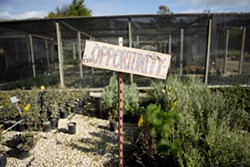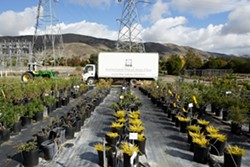Green and gainfully employed
For Transitions Mental Health Association, plants offer employment and therapy
By Ashley Schwellenbach[{
"name": "Ad - Medium Rectangle CC01 - 300x250",
"id": "AdMediumRectangleCC01300x250",
"class": "inlineCenter",
"insertPoint": "8",
"component": "2963441",
"requiredCountToDisplay": "12"
},{
"name": "Ad - Medium Rectangle LC01 - 300x250",
"id": "AdMediumRectangleCC01300x250",
"class": "inlineCenter",
"insertPoint": "18",
"component": "2963441",
"requiredCountToDisplay": "22"
},{
"name": "Ad - Medium Rectangle LC09 - 300x250",
"id": "AdMediumRectangleLC09300x250",
"class": "inlineCenter",
"insertPoint": "28",
"component": "3252660",
"requiredCountToDisplay": "32"
}]
Growing Grounds is a place of peace in San Luis Obispo’s bustling—not by city standards perhaps, but certainly from a rural perspective—downtown. Spanish herb jars, books about gardening, gazing balls, jars of olive oil, and citrus-honey-and-lemongrass scented soap indulge all five senses. It doesn’t hurt that the majority of the goods are located outside, beneath the sky, lending a grander perspective to the narrow walkway lined with gurgling fountains, azaleas, and Meyer lemon trees.
“When they’re here they get to learn things like product display, using a cash register, using Quicken, using standard tools that employers would look for in an applicant,” said Public Relations Coordinator Hannah Brown. “We’re trying to remove the stigma of mental illness.” Employers across the county, including delis, grocery stores, and guitar manufacturing companies, participate in the program, which pairs Transitions clients with employment opportunities that match their skills and interests. The employee also partners with a job coach to maximize benefits to both employer and employee.
Growing Grounds has been in operation for about four years, Transitions Mental Health Association for 30, and the farm in San Luis Obispo—near the intersection of Orcutt and Johnson beneath power lines stretched like banners—is about to celebrate its 25th birthday. The seven-acre farm is situated on land owned by PG&E; when the land became available for use employee James Haas offered it to Transitions.
Besides employment, Transitions clients receive horticultural therapy. According to farm manager Craig Wilson, horticultural therapy incorporates satisfaction from nurturing living things and a connection to the earth through the soil. Employees work Tuesday through Thursday from 10 a.m. to 1 p.m. performing tasks that range from potting young plants to pulling orders placed by landscaping companies. Wilson estimates that he’ll get between 20 and 25 employees on an average day, though numbers can swell to more than 30 on occasion.
“We have people that come and stay a week and we have people that have been here 15 years. It really depends on where they are in their recovery,” he explained. “The emphasis is certainly on providing them with the skills they need to move on to competitive employment.”
Wearing hats and loose work clothes to protect against the surprisingly hot sun, employees bustle throughout plots and greenhouses labeled after planets; Pluto’s where the infant plants end up after they are released from the potting shed, and the plants are primarily grouped into a planet’s plot according to water needs. Murals of butterflies and flowers cheerfully inhabit the walls of the potting sheds.
Employees mostly work with plants native to California and other suited to a Mediterranean climate; that’s what the demand is for on the parched Central Coast. Although, Wilson insists that “plants, like clothes, go in and out of fashion.” He is forever searching for new plants to supplement the more than 60,000 currently in residence at the farm. He cites grasses as the current popular trend. The farm’s business is pretty much split into thirds; one segment is the landscapers who purchase their plants, another is the retail outlet presented by Growing Grounds, and the final is restoration work commissioned by the Land Conservancy.
One greenhouse—named Ganymede—is filled with native sprouts, some thriving, others dying. According to Wilson, propagating native species is the most difficult task at the farm, and just about the only way to acquire these plants in the first place is to take cuttings. Thanks to a grant from the Hind Foundation, the odds of success may soon increase with the refurbishing of the greenhouses including improved heating and climate-control systems as well as new sprinklers.
Efforts are also underway to make the farm’s operations as green as its landscape; this summer, they installed solar panels that produce about 60 percent of the energy required for farm operations. The total cost of the panels approached $30,000; a grant from PG&E funded more than half of the costs. It’s not uncommon for the students from Cal Poly and Cuesta and such groups as the Eagle Scouts to donate their time to farm improvement projects as well. Brown sees the community’s involvement with the program, as well as its very survival, as a seal of community approval.
“Non-profits rely on community support and community support means that you really are making a difference,” she explained. “Thirty years of making a difference is definitely encouraging.”
Financially, the farm and store seem to be surviving, funded primarily through Prop. 63 (The Mental Health Services Act), which passed in 2005. The act specifically earmarks money for recovery-based innovative programs. The program’s second farm, on the other hand—several acres in Santa Maria that produce crops and flowers—recently had its budget slashed by $130,000, emphasizing Brown’s statement that all of Transitions’ programs must be flexible in order to survive. And with 27 locations between Paso Robles and Lompoc and more than 30 programs ranging from youth treatment to housing solutions, there is no room to consider any possible future for Transitions beyond continued growth.
At the San Luis Obispo farm, and retail outlet, that growth just happens to be mirrored by the literal cultivation of vegetation.
“People here have as good a work ethic as anybody I’ve worked with in the private industry,” concluded Wilson.
Arts Editor Ashley Schwellenbach believes that plants will one day bend humanity to their will. Send apocalyptic wishful thoughts to [email protected].













